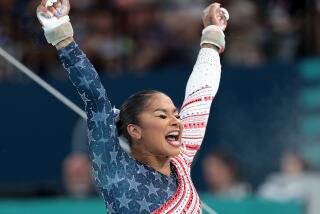Cyclist Landis appeals ruling
- Share via
Cyclist Floyd Landis said Wednesday that he has appealed the arbitration ruling that stripped him of his 2006 Tour de France title and suspended him from competing for two years on allegations that he took testosterone during the marquee race.
“There are things in that ruling that were just plain decided wrong,” he said from his home in Murietta.
“I still hold out a little bit of hope that there are people who care about the facts.”
Landis’ appeal will go to the Lausanne, Switzerland-based Court of Arbitration for Sport. His attorneys and those of the U.S. Anti-Doping Agency, which brought the accusation against him, have until Oct. 18 to file preliminary briefs.
By mid-November the court is expected to set a hearing date. Unlike Landis’ original arbitration hearing, which took place before a three-man panel in May, the CAS hearing will be closed to the public.
Landis, 31, has maintained his innocence ever since his urine sample from Stage 17 of the 2006 Tour was declared positive for testosterone use by a French doping lab. At the arbitration hearing, his defense contended that procedural errors and departures from mandated procedures by the lab produced inaccurate readings.
Last month the panel ruled against him by a vote of 2-1. The majority, -- Canadian arbitrators Richard McLaren and Patrice Brunet -- acknowledged that the lab was guilty of “sloppy practice” in some respects and that some of its work contravened international lab standards. But they ruled that the errors were not serious enough to overturn the lab’s findings. By contrast, the third arbitrator, Bay Area attorney Christorpher Campbell, argued in a written dissent that the lab’s documentation was “so filled with errors” that Landis should be found innocent.
In a statement posted on the website of the Floyd Fairness Fund, which he established to raise funds for his defense, Landis indicated Wednesday that the lab’s poor performance will remain at the center of his case: “The anti-doping authorities must uphold the highest levels of appropriate process, technical skill, science and professional standards to pronounce judgment on matters that hold an athlete’s career, accomplishments and livelihood in the balance.”
Landis’ appeal comes as public skepticism about athletes has been stoked by the case of Marion Jones, the former Olympic sprinting champion. Jones pleaded guilty in federal court last week to having lied to government authorities when she denied taking steroids before the 2000 Sydney Games. The plea contradicted Jones’ years of denials of drug use, and is likely to have undermined the credibility of other athletes who have protested their innocence. This week she returned the five medals she had won in Sydney.
Landis expressed sorrow for Jones but argued that her plea should not affect the public’s opinion of his case. “I don’t know that one more case like that is going to change anyone’s perspective,” he said.
Landis spent an estimated $2 million on his first-round appeal, but he said the second round won’t cost as much. His defense will be able to reintroduce evidence it developed for the first hearing, and he noted that much of the money already spent was used to educate his legal team in the complexities of doping science and the anti-doping program’s procedures, an effort that won’t need to be repeated.
More to Read
Go beyond the scoreboard
Get the latest on L.A.'s teams in the daily Sports Report newsletter.
You may occasionally receive promotional content from the Los Angeles Times.










